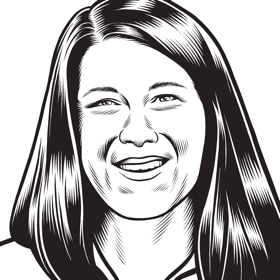Lydia Millet is a prolific novelist and Pulitzer Prize finalist whose work has received the PEN Center USA Literary Award for Fiction and, recently, a Guggenheim Fellowship. Millet is a keen satirist—both dark and affectionate, brutal and humane. This interview began as an inquiry into her work as a copy editor for Larry Flynt Publications, from 1991 to 1994.
—Colin Winnette
THE BELIEVER: When did you first begin to work for Larry Flynt Publications?
LYDIA MILLET: I was desperate. Right after college I went to grad school but dropped out after one term and moved to LA; it was 1991 and there was the first Gulf War and a recession on. I’m sorry, “economic downturn.” After a few jobless months of increasing anxiety, I got a job as a dogsbody for a failing screenplay agent/lawyer who ran light scams, then an aging producer of TV after-school specials who threw a five-gallon Sparkletts bottle at my head. When someone told me I could take a proofreading test at LFP and join the copy pool if I passed, I jumped for joy. The proofreading marks were right there in the dictionary, under “Proofreading Marks.” I worked there for three years, correcting typos in magazines like SWAT: Special Weapons and Tactics for the Prepared American, Fighting Knives: America’s Most Incisive Cutlery Publication, Busty Beauties, and, finally, Hustler.
BLVR: How long did you stick around after the Sparkletts bottle? That sounds like an awful situation.
LM: Well. If you’re going to insist on honesty, it was an empty Sparkletts bottle. And it didn’t actually hit me. Still, the insult rankled. My boss made me put a car cover on her white Jaguar every morning. It was awkward, grappling with that cover. I had a spiral perm in those days, a kind of boxy, poodle-head look, and wore ’80s office clothing—shoulder pads, floral prints. So picture that, if you’re made of strong enough mettle. A poodle-head wrangling a car cover. All told, not a self-esteem booster. These were jobs that paid under $250 a week with no benefits. Before taxes.
BLVR: Once you joined LFP, did you have say over which magazines you edited? Did you have a preference?
LM: In the copy pool you went where you were asked to go. At the beginning I was put on magazines for weapons enthusiasts, which no one else wanted to do. However, our copy chief, Kim, was a humanitarian. I think she knew I’d rather do porn than guns, in the end. Love not war, etc. That’s how I roll. So she moved me.
BLVR: Your book Everyone’s Pretty is reportedly based on your time working...
You have reached your article limit
Sign up for a digital subscription and continue reading all new issues, plus our entire archives, for just $1.50/month.
Already a subscriber? Sign in





